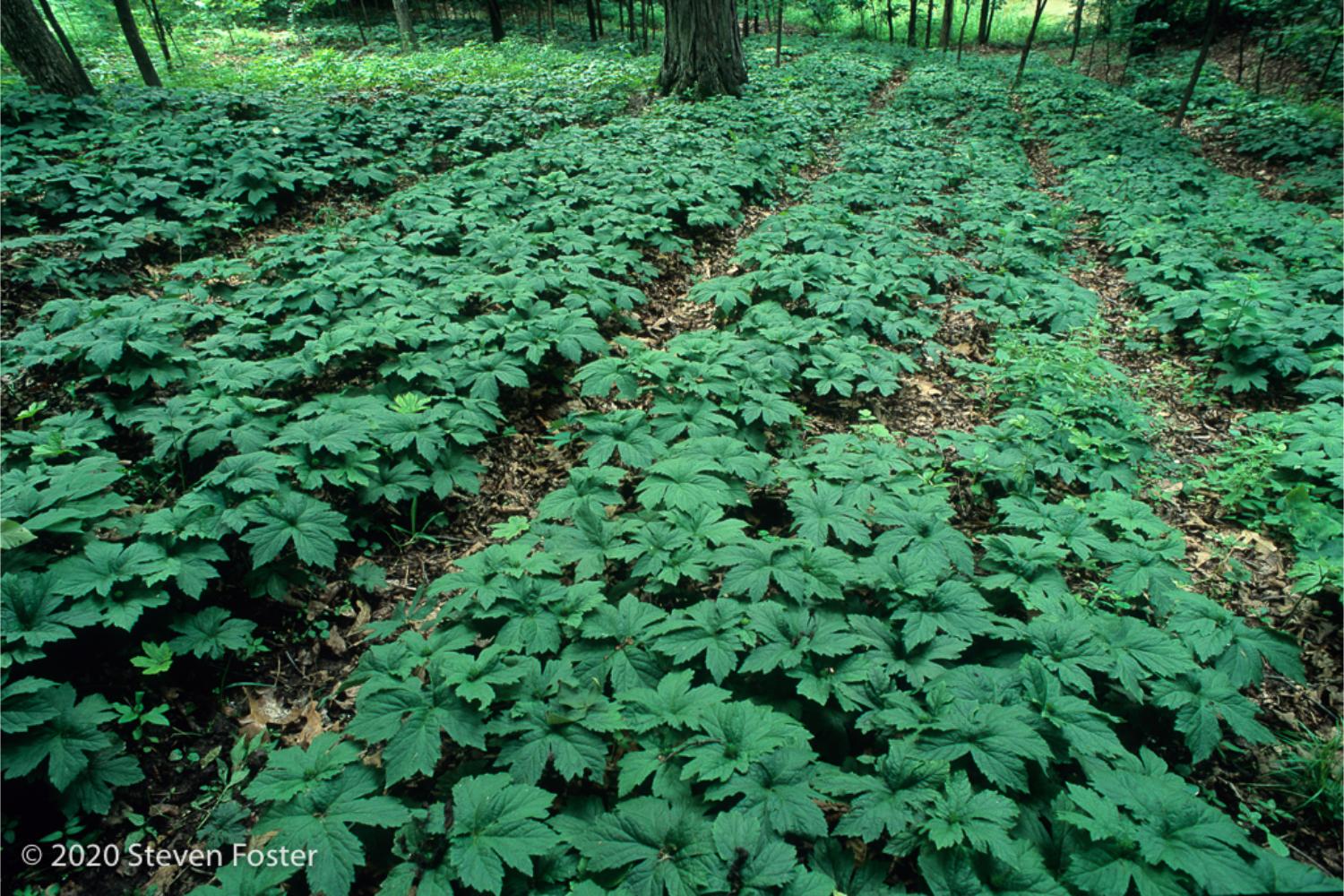Forest Farming in Appalachia

Forest Farming in Appalachia
What is Forest Farming?
What’s not to love about farming in the woods? Forest farming is an agroforestry practice where non-timber forest products (NTFPs) are stewarded and/or cultivated in the forest understory. Forest farmers manage the trees above to enhance shade levels and create habitat for optimal NTFP production. NTFPs include medicinal (i.e. ginseng, goldenseal, black cohosh), edible (i.e. ramps, mushrooms, syrups), and ornamental, craft, and landscaping (i.e. vines, florals) crops.
What are the Benefits of Forest Farming?
Wild populations of forest botanicals are threatened by over harvesting and habitat loss, and some are listed as at-risk and vulnerable to extinction as a result. By sustainably growing forest botanicals in the understory, forest farmers help conserve these plants to ensure they are here for generations to come. However, traditional prices paid for forest botanicals are often too low to cover the costs of producing these plants. With fair wage prices from conscious consumers, forest farming can improve livelihoods for Appalachian farmers dedicated to sustainable practices.
How Much is Harvested from the Wild?
One challenge to predicting sustainable wild harvesting is a lack of reliable information on their markets, both how much material is harvested from the forests and how much is being sold. The Root Report is an ongoing project of the Department of Forest Resources and Environmental Conservation at Virginia Tech. The Root Report’s goal is to measure the scope and distribution of non timber forest product production and its economic impact. This is more challenging than it may seem.
The ginseng trade is well documented because buyers are required by law to apply for licenses and keep sales records. Yet sales of other forest botanicals, like black cohosh, goldenseal and others, known as ‘off-roots’, are not tracked. Steve Kruger, the lead researcher for The Root Report, has been researching this off-root trade by surveying registered ginseng buyers about the market structure, volume and harvest. Kruger found that most of the trade in volume and value came from goldenseal and black cohosh roots and rhizomes harvested and sold in central Appalachia. This research is ongoing and provides the crucial information on trade that is needed to determine threats to these wild plants and possible sustainability practices.
For more information, download Medicinal Forest Product Trade in the Eastern US, an infographic describing this research and summarizing volume and pricing findings of the survey.
Exciting efforts are underway to use forest farming as a practice to develop sustainable and ethical supply networks of forest botanicals from Appalachia. Below are some of key initiatives. See the calls to action below to see how you can help!
The Appalachian Harvest Herb Hub
Appalachian Sustainable Development (ASD) founded the Herb Hub in 2017. A shared-use facility in Duffield, VA the Herb Hub envisions a thriving and sustainable herbal economy in Central Appalachia, where at-risk plant conservation is achieved through profitable cultivation. To achieve this goal, ASD offers seed to sale training, on-farm technical assistance, commercial herb processing equipment, and aggregation and marketing assistance to connect a network of medicinal herb farmers with buyers seeking sustainable and ethical supply. Learn more about the Appalachian herb hub.
The Appalachian Beginning Forest Farmer Coalition
The Appalachian Beginning Forest Farmer Coalition (ABFFC) is a network of forest farmers, universities, and governmental and non-governmental organizations that share a common goal of improving agroforestry production opportunities and farming capabilities among forest farmers. The collective aim is to increase awareness, capacity, and long-term viability through education, networking, and conservation.
See the ABFFC website to get more information, resources, and news about upcoming events and trainings.
Wild Stewards Alliance
The Wild Stewards Alliance is a point-of-harvest initiative that offers free training on industry best practices, and certification to wild harvesters and dealers of woodland roots, barks, and herbs.
This initiative is led by Virginia Tech and Appalachian Sustainable Development’s Appalachian Harvest Herb Hub in Central Appalachia. Find out more.
Grow Your Own!
- Growing and Marketing Ginseng, Goldenseal and other Woodland Medicinals by Jeanine Davis and W. Scott Persons
- The Forest Farmers Handbook, written by Rural Action and United Plant Savers, outlines how to grow understory herbs, focusing on ginseng, goldenseal, ramps, bloodroot, and black cohosh. Available as a free PDF here or to purchase from Amazon.
- Videos on the ABFCC YouTube Channel outline practices for growing and sustainably harvesting some key forest botanicals. We have included these videos on the plant pages.
- Check out the United Plant Saver’s Take Action Guide to create a medicinal plant trail, conduct plant rescues, and grow a medicinal plant garden.
- The Chestnut School of Herbal Medicine has created two useful resources for creating your own forest garden:
Dig Deeper
- “Investing in Forests and Communities: A Pathway to a Sustainable Supply of Forest Herbs in the Eastern United States,” by Holly Chittum, Eric Burkhart, John Munsell and Steven Kruger. This article, published in HerbalGram (2019; 124:60-76), introduces forest farming as a potential solution to many of the challenges faced within the current forest herb supply chain. The article provides an account of the history of the forest herb trade, conservation, social, and economic concerns, and a proposed path forward.
- “In Appalachia, Forest Farming is Protecting Wild Botanical Plants,” an article by Jodi Helmer was published in Civil Eats on February 19, 2020.
- Learn more about what ABFFC partners are doing, find trainings in your area, and other ways to be involved.
